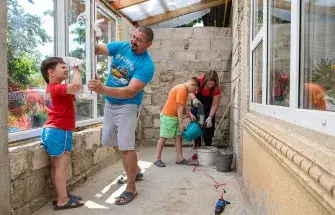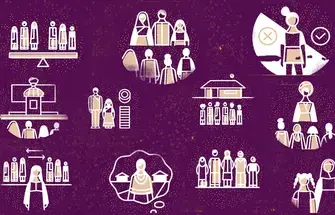In Eastern Europe and Central Asia, women spend 3 hours more per day on unpaid care work than men. Add paid work into the mix and many women are essentially pulling a “double shift” every day. During the COVID-19 pandemic, the load of unpaid care work shot up dramatically and it was mothers, and women in general, who took up the slack.
Ensuring that men and women share responsibilities in the household equally requires real, sustainable change – from the attitudes and behaviors of individuals all the way to our policies and institutions.
Here are five ways men can get serious about smashing stereotypes and sharing responsibilities equally in the home.
1. It’s time to talk.
Combatting stereotypical gender roles within families and finding more equal ways of sharing tasks and duties begins by talking to each other. Who in your family does what, when and how often? Talk about what’s fair, what’s right and how you can all share tasks. Draw up a list to see how household tasks are currently shared and ask yourself, am I doing my fair share? Remember, this isn’t a one-off talk, but rather the starting point for a longer-lasting change in the way you share unpaid care and domestic work!
2. Share the responsibility of care…
Women generally do a disproportionate amount of unpaid care and domestic work. However, chores do not have a gender, and women are not better at doing domestic or unpaid work than men, despite entrenched beliefs. In fact, men and women can equally pick up a broom, or care for a child or older relatives. So step up to your responsibilities and start tackling domestic tasks, from grocery shopping and reading to your children to the more tedious ones, like cleaning and ironing.
3. …and the mental charge that comes with it
There’s a mental and emotional toll to remembering, thinking about and planning all these family tasks. Ask yourself, who takes care of scheduling medical appointments, remembering a grandparent's upcoming birthday, liaising with school teachers or deciding what to eat for dinner? Are you playing your part? Don’t underestimate the time it takes and the stress that comes with being the only one to think about and plan these tasks, and take responsibility for the mental charge that comes with unpaid care work.
4. Set an example, create change
Sharing domestic work and duties in a balanced and fair way works to create a more stress-free and positive family environment. But it can also impact family members in many aspects of their lives! When you share the workload at home, you also become a more engaged partner and father. And the benefits are passed on to your children. Men who grew up seeing more equal relationships between their parents are themselves more equal. You can also involve your children in discussing and sharing housework, for example using fun bingo cards developed in collaboration with COFACE Families Europe.
Sharing the tasks in the home is a win-win for everyone!
5. Societal change begins in the family, but it does not stop there
While families can start to address inequalities at home right away, why not look at the bigger picture too. For example, women’s advancement in the workplace is hindered by the disproportionate responsibilities they continue to take on at home. How about pushing for broader change? Lobby your government, and your employer, to support more equal sharing of unpaid care work, flexible work arrangements, paternity leave, childcare and more help to care for older people. At work, women are far more likely to take on the unrecognized, unpaid, unpromotable tasks such as taking notes, event planning, tidying, etc. Why not push to stop that, smash stereotypes and force change across the board?
Remember: Sharing family and household tasks isn’t about gestures. It’s about taking up responsibilities. Permanently.














